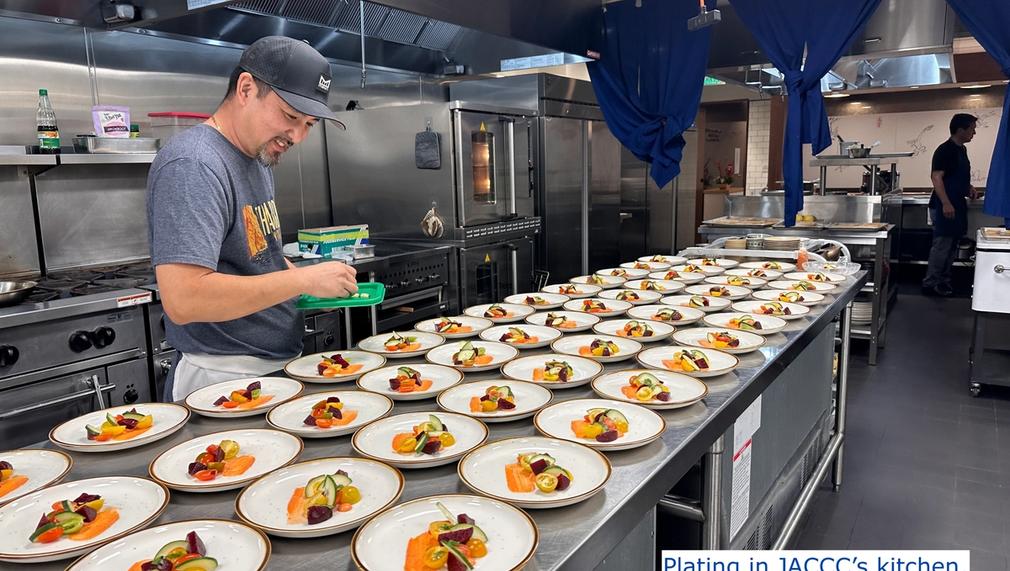Using Culinary Arts to Empower and Connect Justice System-Impacted APIs
We propose to increase access to creative industry employment for a cohort of justice system-impacted Asian Pacific Islanders (APIs) by building skills and social support networks by preparing artful, culturally-authentic meals for elderly, food insecure neighbors in LA’s Little Tokyo. Training under a professional chef, the cohort will give back to the community while preparing for employment in the culinary arts industry. This pilot program is designed to disrupt the status quo of traditional reentry programs and Meals On Wheels.

What is the primary issue area that your application will impact?
Access to tech and creative industry employment
In what stage of innovation is this project, program, or initiative?
Pilot or new project, program, or initiative (testing or implementing a new idea)
What is your understanding of the issue that you are seeking to address?
For 40+ years, the Japanese American Cultural & Community Center (JACCC) has used the arts–culinary, performing, and visual–to increase the social connectedness of Downtown LA’s Little Tokyo neighborhood. In this spirit, we seek to engage two often overlooked groups. With referrals from our neighbors at API Rise, we will engage APIs impacted by the judicial system. Reentry into the community is difficult enough, but formerly incarcerated APIs also deal with the stigmas of cultural shame, silence, and apathy. We will empower a pilot cohort with culinary arts training for future employment in the creative industry. The cohort will give back to the community by preparing free, culturally-appropriate meals for our food insecure neighbors at Little Tokyo Towers, a senior independent living facility where the 450 residents are 97.7% Asian, 76.5% elderly, and have an average gross monthly income of $966. JACCC’s programs already show how much artful meals lift the spirits of the elderly.
Describe the project, program, or initiative this grant will support to address the issue.
For six justice system-impacted APIs, this pilot program will expand access to employment in a lesser known segment of the creative industry–the culinary arts–to disrupt the status quo of traditional reentry programs and Meals On Wheels. We will train a six-person cohort for future culinary arts careers, providing stipends (to honor their efforts and help defray expenses such as child care), Metro passes, skills, certifications, and strengthened social support networks. Training under a veteran, community-minded chef, the cohort will also build camaraderie as they learn philosophies of service/hospitality. For added advantage in the very competitive culinary arts industry, the cohort will be provided with uniforms, training materials, and support to receive Serv-Safe and California Responsible Beverage Training certifications. Upon program completion, staff will provide referrals into professional kitchens to jumpstart their careers in the creative industry. Finally, the cohort will have a chance to give back to the community by working together to prepare a Japanese bento lunch for elderly, food insecure neighbors living in the Little Tokyo Towers senior independent living facility. We are already looking forward to the smiles on the faces of the elders when they see these artfully-designed and culturally-authentic meals. We hope this empowerment might start a transformational social change that will reverberate throughout all of Los Angeles.
Describe how Los Angeles County will be different if your work is successful.
In the Asian American Research Journal (Issue 1, Volume 1, 2021), author Janie Chan urges us to rethink traditional reentry programs to include culturally-relevant supports that help APIs break the cycle of harm, build new social networks, and deepen a sense of belonging through community organizations. JACCC seeks to recognize and celebrate the cohort’s cultural backgrounds by strengthening their sense of belonging within our historic community of Little Tokyo, a Downtown LA neighborhood that is home to 4,000+ residents who are predominantly Asian (40%), Black (26%), and Hispanic (20%); linguistically isolated (47%); elderly (25%); and have an average household income of $15,000/year, which is $35,000 lower than the rest of the city. If this pilot is successful, we will formalize partnerships with our neighbors at API Rise and Little Tokyo Towers so we may train more/larger cohorts and provide more meals.
What evidence do you have that this project, program, or initiative is or will be successful, and how will you define and measure success?
We will define and measure success both quantitatively and qualitatively. Quantitatively, we will be successful if we are able to recruit six students; at least two-thirds of the students gain the Front of House and Back of House skills and certifications needed to complete the program; we serve meals to at least 150 food insecure elders; and that at least two-thirds of the cohort gets culinary arts jobs upon program completion. Qualitatively, we will conduct interviews with the cohort, the elderly, and the staff to gauge how program participation deepened a sense of their API heritage and ethnic identity while strengthening their feelings of social connectedness, easing their reentry, and increasing their sense of belonging in the Little Tokyo community. In success, we will formalize partnerships with Little Tokyo organizations to increase the number of participants and meals served to the elderly. We would also be happy to mentor others interested in implementing similar programs.
Approximately how many people will be impacted by this project, program, or initiative?
Direct Impact: 206.0
Indirect Impact: 100.0